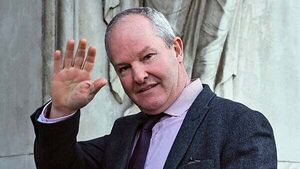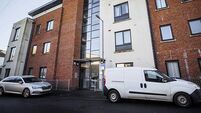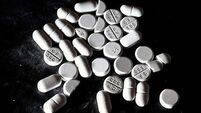Doctor accused of professional misconduct over Covid-19 criticism alleges collusion

Seán McCárthaigh
A Dublin-based GP accused of professional misconduct for criticising Covid-19 measures and restrictions on social media has claimed there has been “a degree of collusion” to frame evidence against him at a medical inquiry.
Marcus de Brun called for the evidence of an expert witness, Colin Bradley, who had concluded that the GP’s actions were “disgraceful and dishonourable”, to be excluded from the case against him.
The application for the evidence of Prof Bradley to be excluded arose after Dr de Brun claimed the concerns of the expert witness about a viral immunologist, Graham Bottley, who made a complaint about the GP to the Medical Council, were not referenced in a report which Prof Bradley provided to a committee which recommended he should face a fitness-to-practise inquiry.
Dr de Brun claimed plans by the Medical Council to call Dr Bottley as a witness were only abandoned earlier this week after he had objected.
He also argued that Prof Bradley’s evidence should be excluded because the expert witness had been asked by the regulatory body’s Preliminary Proceedings Committee to provide it with an additional report that addressed the “seriousness” of the GP’s actions.
Dr de Brun told the fourth day of an inquiry before a Fitness-to-Practice Committee of the Medical Council that it would be unfair if Prof Bradley’s evidence was admitted as it “lacks independence.”
The father of four, who operated his own practice in Rush, Co Dublin, is accused of ten counts of professional misconduct over his criticism of public health guidelines, lockdowns, the wearing of facemasks and Covid-19 vaccines during the pandemic.
The allegations also relate to comments he made at a public rally in Dublin in August 2020, when he was also accused of failing to wear a facemask and observe social distancing.
The Medical Council claims Dr de Brun’s comments and actions were inappropriate and undermined public health guidelines, as well as running contrary to sections of the Guide to Professional Conduct and Ethics.
However, the GP maintains that the deaths of his patients in a nursing home during the pandemic and the subsequent anger and upset he expressed on Twitter were “a consequence of Government guidelines and inaction of the Medical Council.”
Dr de Brun resigned from the Medical Council in April 2020 over what he claimed was the State’s failure to protect nursing home residents.
It emerged on Friday that Dr Bottley made a complaint about Dr de Brun to the regulatory body in January 2021 after they had “a Twitter spat.”
The inquiry heard that Prof Bradley had subsequently cautioned the Medical Council in an e-mail in August 2023 against relying on social media posts by Dr Bottley to challenge the views of Dr de Brun, as his standing was “the subject of some controversy.”
Under cross-examination by Dr de Brun, who is representing himself at the inquiry, Prof Bradley accepted he had made no reference to his concerns about Dr Bottley in any report he had supplied to the Medical Council.
Prof Bradley said Dr Bottley was someone whose opinion he would not hold in high regard because he was “a controversial figure who presents himself as a virologist.”
However, he also said that it was “particularly inappropriate for a medical practitioner” to be having the sort of discussion online, like by Dr de Brun, which was encouraging “vaccine hesitancy.”
Prof Bradley said he had relied on the views of bodies like the National Immunisation Advisory Committee in assessing whether there had been serious failures by the GP rather than on the Twitter spat involving Dr de Brun.
He told the inquiry that he believed the doctor had “crossed the line” into a serious misuse of social media when he used it to discourage compliance with public health guidelines in the middle of a serious pandemic.
Prof Bradley accepted that it was his fault that he had not addressed the issue of the seriousness of Dr de Brun’s conduct in his initial report to the Medical Council but rejected any suggestion that he was given directions about the content of what he put in any report.
Counsel for the Medical Council, Neasa Bird BL, said the request of the Medical Council of Prof Bradley to specifically address the question it had posed to him with another report did nothing to undermine his independence as an expert witness.
Ms Bird rejected the suggestion made by Dr de Brun that the Medical Council was trying “to coach or coax” how Prof Bradley presented his evidence.
She maintained nothing claimed by the GP undermined the independence, credibility and reliability of the expert witness.
Under cross-examination, Dr de Brun told Prof Bradley that claims that he was dismissive towards his own patients were “an emotive issue” given he had 23 years of unblemished practice as a GP.
“I consider myself to have a very, very good and a very empathetic and a very caring relationship with my patients,” he added.
Dr de Brun read out an email from a patient who said he would be greatly saddened if their interaction on social media was taken out of context.
The patient also stated he had never taken any offence from anything said to him by Dr de Brun, either privately or publicly, including on social media.
“I would frankly find it absurd to suggest otherwise,” the patient remarked.
However, Prof Bradley said his concern was that while the GP’s tweet might have been directed at someone he knew, it could be interpreted by others as being dismissive of their condition.
“I felt it was very open to the interpretation that you were being dismissive of patients with diabetes or long Covid,” said Prof Bradley.
He added: “Once it’s on Twitter, it’s a comment that’s open to everyone to read and be affected by it.”
The inquiry heard that Prof Bradley had also remarked that some of Dr de Brun’s statements were supported by other doctors and commentators “who are more reasonable in how they present their critiques of government policy to the Covid-19 pandemic.”
The inquiry’s chairperson, Deirdre Murphy, adjourned the hearing and said the committee would give its ruling on the application to have Prof Bradley’s evidence dismissed on a future date.




